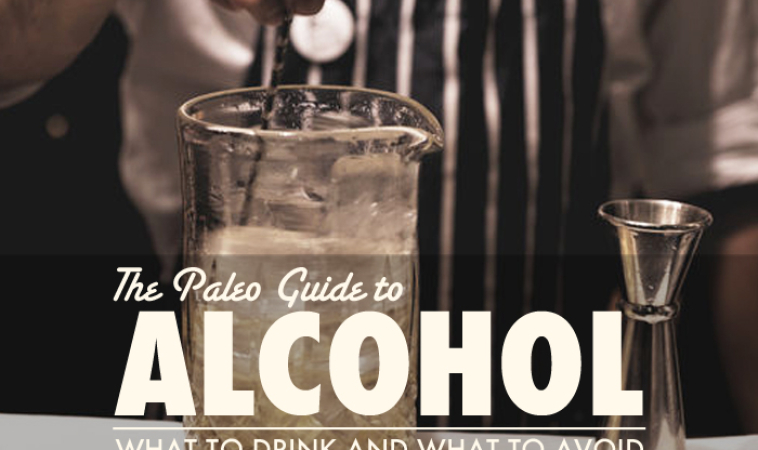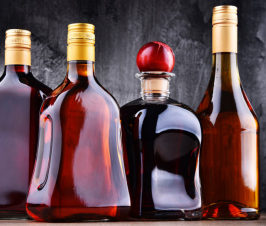Dr. Marc Bubbs ND, CSCS
@DrBubbs
Gluten-free ciders, grain-free vodkas, antioxidant-filled red wine and tequila as a digestive aid. These days the alcohol industry has a new marketing tactic… playing up the health benefits of their products. But, without nutrition labels on liquor, just what are the health effects of alcoholic beverages, and can they fit into a Paleo lifestyle?
The principles of an ancestral approach to eating– wild and grass-fed meats, healthy fats in all forms, plentiful vegetables and fruit and nutrient dense carbs like roots and tubers– make a fantastic foundation for your best health and performance. However, I often see worry on my clients’ faces when they ask me, “Can I still have some alcohol in my diet?” Does adopting a Paleo diet mean you have to say goodbye to alcohol for good?
Embedded in the fabric of ancestral and primitive tribes from across the globe seems to be the use of music and alcohol at social gatherings and festivals. While it’s true Paleo hunter-gatherers did not consume alcohol, about 5,000-10,000 years ago it seems our foraging ancestors likely did consume ethanol (alcohol) in the form of fermented fruit.1 Indigenous peoples likely figured out that fruits, when left out too long or going bad (i.e. fermented), produced a relaxing and euphoric feeling when eaten.
If alcohol has been consumed for centuries does this mean it qualifies as Paleo-friendly? More importantly, are there any health benefits to consuming alcohol or is complete abstinence the ideal platform for optimal health? Let’s take a closer look and see how alcohol impacts overall health and how it can be integrated into a Paleo lifestyle.
Does Alcohol Have Health Benefits?
Like most things in life, the answer to this question is all about the dose. Research shows that those who abstain completely from alcohol don’t live longer than those who enjoy a drink or two.2 This knowledge may help you sleep better at night but there is definitely a tipping point at which too much alcohol can harm your liver and your health.
A recent review study of the current medical literature showed that modest alcohol consumption, one to two units per day, is the magic number that helps significantly reduce cardiac disease risk and boosts markers associated with a healthy heart (e.g. “good” HDL cholesterol, apolipoprotein A1, and fibrinogen, a protein that helps support blood clotting).3
So, if you are a moderate drinker consuming no more than one to two units per day, here is a quick look at how wine, spirits, beer and cider break down in terms of health benefits, and where each of these fits into a Paleo dietary approach.
Wine
Wine was likely the first alcohol consumed because grapes contain just the right mix of sugars and thin skin that, when spoiling, would have fermented and intoxicated our early ancestors. The health benefits of wine are quite diverse and best encapsulated in the French paradox (where the regular consumption of wine and high fats leads to one of the longest life spans in the world).
Red wine in particular is very nutrient dense and rich in polyphenols like resveratrol, which supports better brain health, fights inflammation and packs a big antioxidant punch. Red wine has been shown to support better cardiovascular health, fight dementia and cognitive decline and can even be included in succesful low-carb dietary approaches for weight loss (a glass of red wine per night AND weight loss… seems too good to be true!)
To get the biggest health bang for your buck go for pinot noir and cabernet sauvignon grape varieties, shown to have the greatest antioxidant activity when compared to all other varieties.
The main hiccup in wine is the addition of sulphites, strong antimicrobials that help to preserve wine and prevent the unwanted growth of bacteria, yeast, or other microorganisms.4 The real question is, are too many sulphites bad for you? Likely yes, but to what degree is really unknown. Commom symptoms of excessive sulphite intake are quite similar to being drunk or experiencing a hangover and include: flushing, fast heartbeart, stomach upset, diarrhea and abdominal pain (sounds like a rough hangover!).
A major problem is companies are not required to disclose the amount of sulphites they add to wine, so you really don’t know how many are added to each bottle. In general, half a bottle of wine (or less than 450ml) will keep you below the general recommendations for sulphite levels. If you do have a few too many, excessive sulphite intake may be causing some of your hangover symptoms the next morning. Try taking a molybdenum supplement – a trace mineral that helps the body process sulphites – before bed and in the morning to offset.
Spirits – Paleo-Friendly Tequila & Gin
To qualify as Paleo-friendly spirits need to be gluten-free so, in terms of spirits, this knocks scotches and rums out of the mix. Tequila, made from the blue agave plant, is naturally gluten-free and is a staple for many Paleo-eaters who imbibe in some alcohol. Like all spirits, tequila is a digestif (beverage that supports optimal digestion), making it a great choice before or after meals. Be sure to avoid tequila gold, which contains colouring and additives, and be careful of anything with a worm in it!
Most people don’t realize that gin comes from juniper berries and is another great Paleo-friendly option. Juniper berries have been used in traditional herbal medicine to protect the kidneys and bladder from infection and like tequila act as a digestive aid. Interestingly, cocktail recipes that are gin-based can easily be swapped out for tequila, giving you a plethora of options for your next weekend get-together with friends. (Note: most vodkas are grain-based but there are a few potato or grape-based brands which could make up your Paleo-friendly drink repertoire.)
Cider
Cider is all the rage right now, a gluten-free option to beer typically made from apples that offers a crisp and refreshing taste in the summer months. New research shows that half a pint of cider is equal to a glass of wine for antioxidant benefits and has been shown to be protective against heart disease and certain cancers.5
Dry ciders have less than 0.5% residual sugars making them your best bet for a relatively lower carb option. Comparatively, semi-sweet ciders contain 2% or more residual sugars giving them a much sweeter and more pronounced apple taste. In the hot summer months, you can’t go wrong with a cold, refreshing cider!
Beer
Lastly, and this one is pretty straight forward… beer is definitely NOT Paleo. That said, I am a firm believer in the 80/20 rule to life, so if you don’t suffer from digestive, inflammatory or weight gain concerns, a glass or two on the weekend shouldn’t derail your health. Again, what most people want to know is does beer have any health properties? Absolutely.
The medical definition of nervine is a medicinal preparation, usually of herbal origin, which is said to act on the nervous system to reduce anxiety and tension and strengthen neural function. One of the most commonly used nervines by herbalists is Humulus lupulus or hops (yes, the stuff you drink in beer!). It’s not just your imagination that a drink helps to “take the edge off” after a busy day at the office, training, or taking care of the kids.
Beer is a good source of b-vitamins, is associated with reduced risk of hypertension, can raise good ‘HDL’ cholesterol, and acts as a natural blood-thinner. However, just like wine your dose of beer dramatically impacts it’s health benefits.
Too much beer leads to the classic beer belly, a clear sign of dysbiosis or excessive “bad” gut bacteria, accumulation of visceral body-fat and systemic inflammation, all of which are signs of poor health. If you’re going to indulge in a non-Paleo beer or two, stick with unpasteurized local brews as they contain live enzymes, healthy bacteria and B-vitamins that occur naturally from the fermentation process. If you want a bigger antioxidant hit, go for dark beers higher in antioxidants.
Remember, the research shows that any health benefits from drinking alcohol (wine, beer or spirits) are limited to one to two drinks. Consuming in excess not only leads to excessive caloric intake, but also impairs deep sleep, which leads to fatigue and poor recovery. It can worsen blood sugar and insulin control, and accelerate aromatization (conversion of testosterone to estrogen), leading to hormonal imbalances in men and women. Binge drinking is classified as only four units for women and five for men, the point at which the damaging effects on the body significantly increase (one unit of alcohol is approximately 1.5 ounces of spirits, 6-ounce glass of wine, or a bottle of beer).
If you don’t drink alcohol, there is certainly no need to start just to experience its beneficial effects (there are far more effective ways to improve your health). However, if you do enjoy a drink or two, moderate alcohol may support overall health and wellness and can arguably fit into a healthy Paleo lifestyle. Just remember, it’s all about the dose… moderation is the key!
 Dr. Marc Bubbs, ND is a Naturopathic Doctor, Strength Coach, Speaker, Blogger, and Author of The Paleo Project – A 21st Guide to Looking Leaner, Getting Stronger, & Living Longer. Marc also serves as the Sports Nutrition Lead for the Canadian Men’s National Basketball Team and believes that diet, exercise, and lifestyle factors have the most profound impact on your overall health and performance.
Dr. Marc Bubbs, ND is a Naturopathic Doctor, Strength Coach, Speaker, Blogger, and Author of The Paleo Project – A 21st Guide to Looking Leaner, Getting Stronger, & Living Longer. Marc also serves as the Sports Nutrition Lead for the Canadian Men’s National Basketball Team and believes that diet, exercise, and lifestyle factors have the most profound impact on your overall health and performance.
References:
- Cordain L, Eaton SB, Sebastian A, Mann N, Lindeberg S, Watkins BA, O’Keefe JH, Brand-Miller J. Origins and evolution of the Western diet: health implications for the 21st century. Am J Clin Nutr. 2005 Feb;81(2):341-54
- Holohan, C et al. Late-Life Alcohol Consumption and 20-Year Mortality. Alcoholism: Clinical & Experimental Research. 2010 Aug, Vol 24, Issue 11.
- Ronksley, P. et al. Association of alcohol consumption with selected cardiovascular disease outcomes: a systemic review and meta-analysis. BMJ 2011;342:d671.
- Roberts A, McWeeny D. The use of sulfur dioxide in the food industry. A review. J Fd Technol 1972;7:221-38.
Dupont, M et al. Polyphenols from alcoholic apple cider are absorbed, metabolized and excreted by humans. J Nutr 132, 172-175, 2002

















